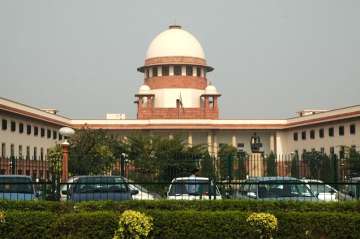Supreme Court seeks panel report on women and family law
New Delhi: The Supreme Court today asked the central government to place before it the report on "Women and Law " by a high-level committee that had undertaken the assessment of family laws with focus
New Delhi: The Supreme Court today asked the central government to place before it the report on "Women and Law " by a high-level committee that had undertaken the assessment of family laws with focus on laws relating to liability, divorce, children custody, inheritance and succession.
Asking the government to submit the report which has not been made public yet, a bench of Chief Justice T.S. Thakur and Justice Uday Umesh Lalit gave it and other parties, including All India Muslim Personal Law Board, six weeks to respond to the suo motu motion and a plea by Shayara Bano challenging the validity of the triple 'talaq' under the Muslim personal law.
Senior counsel Amit Singh Chadha appearing for Shayara Bano told the court that report by the high level committee on "Women and Law" has not been made public yet.
Besides asking the government to file the report, the bench asked it to respond to All India Muslim Personal Law Board (AIMPLB) contention opposing any interference by the court into Muslim personal law in respect of Muslim women rights concerning marriage, divorce and maintenance.
The court asked all the parties to file their respective responses in the course of the hearing of the matter relating to gender equality of Muslim women that was directed to be taken up a PIL by a benche of the top court on October 16, 2015 and a plea by Shayara Bano seeking declaration that triple 'talaq' was illegal and unconstitutional.
She has sought direction to the government and others to declare that the "practices of talaq-e-bidat, nikah halala and polygamy under Muslim personal laws as illegal, unconstitutional" and being violative of the fundamental rights guaranteed under the constitution.
Shayara Bano has said that triple 'talaq' was illegal as it was in violation of the constitution's articles 14 (Equality before law), 15 (Prohibition of discrimination on grounds of religion, race, caste, sex or place of birth), 21 (Protection of life and personal liberty) and 25 (Freedom of conscience and free profession, practice and propagation of religion).
Opposing Bano's plea, the AIMPLB in its intervention application has contended that the "foundational source of Muslim personal law are holy Quran and hadith of the Prophet and thus it can't fall within the preview of the expression 'laws in force' as mentioned under article 13 of the constitution and hence its validity can't be tested on challenge based on fundamental rights.
Contending that if apex court lays down special rules for Muslim women in matters concerning marriage, divorce and maintenance, it would amount to judicial legislation, AIMPLB said that it was not permissible.
It said the rights of Muslim Women are already protected by Muslim Women (Protection of Rights on Divorce) Act, 1986 and the same has been upheld by the top court in 2001.
In such a scenario, if apex court "prescribes other parameters to govern the rights of Muslim women, it would amount to judicial legislation which is not permissible" and would be violative of the doctrine of separation of powers.
It further contended that article 44 which envisages the Uniform Civil Code was only a directive principle of the State policy and was not enforceable.
"Article 44 recognises the existence of different codes applicable to different religions in the matter of personal law and permits their continuance until the state succeeds in its endeavour to secure for all citizens a UCC," AIMPLB said in its intervention application.
The AIMPLB has said that the framers of the constitution were fully conscious of the difficulties in enforcing UCC and thus they deliberately refraind from interfering with the provision of the personal law and laid down only a directive principle.
The apex court had on February 5, 2016 allowed Jamiat Ulama-i-Hind to intervene in the suo motu PIL relating to gender equality of Muslim women.
